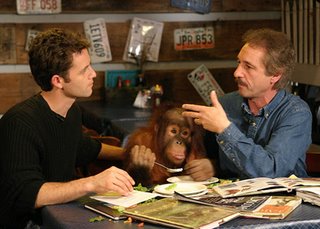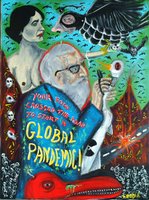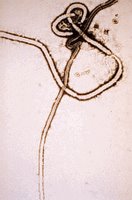 Since I started writing this blog, I have struggled with whether to write about Intelligent Design. Many scoff that it shouldn’t be given a voice, and that writing about it does science a disservice.
Since I started writing this blog, I have struggled with whether to write about Intelligent Design. Many scoff that it shouldn’t be given a voice, and that writing about it does science a disservice. While it’s true that the issue is not exactly controversial within scientific circles, there is substantial controversy among the American public. So, after having the opportunity last week to interact with one of ID’s strongest proponents, I decided to devote a piece to Intelligent Design and evolution.
Darwin’s theory, as I’m sure we all remember from high school science class, explains the evolution of life via two processes: random mutation, or changes in one’s genes, which give organisms different characteristics; and natural selection, in which those organisms with more useful or adaptive characteristics are more likely to survive, reproduce and pass on those characteristics to their offspring.
Intelligent Design, often referred to as ID, is the controversial “alternative” idea that life is too complex to be explained by Darwin’s theory and that it must have been made by God or some other intelligent cause or designer.
The Intelligent Design movement gained momentum last fall in a landmark court case against the Dover, Pa. school district, which wanted to teach ID alongside evolution in its science classes.
But it suffered a blow when U.S. District Judge John Jones III handed down his ruling last December, saying that Intelligent Design has no place in the science classroom. Jones described ID as “an untestable alternative hypothesis grounded in religion.”
Let me begin by saying that I do not reject the legitimacy of Intelligent Design, or religion, for that matter, as a social construct. I think that ID might, in fact, deserve to be discussed in school — just not in science class. I agree with Joel Cracraft, a curator at the American Museum of Natural History, who told an audience at Columbia University in February that there is an unfortunate misunderstanding among Americans that “evolution, in general, threatens people’s religious beliefs.” I don’t think it has to.
But I do firmly believe that Intelligent Design is not science.
As defined in the Merriam-Webster dictionary, science is “knowledge or a system of knowledge covering general truths or the operation of general laws especially as obtained and tested through scientific method.”
I’m sure you at least vaguely remember learning about the scientific method in high school. After a problem is identified or a question is asked, the scientific method requires “the formulation and testing of hypotheses,” or potential answers, via data collection “through observation and experiment.”
The value of science stems from its grounding in the scientific method, which essentially serves as the “check” that keeps science as objective as possible. It also ensures that scientific explanations remain naturalistic and observable.
Let’s therefore think of Intelligent Design as a hypothesis, or possible explanation, for the origin of life. To prove the validity of this hypothesis, the next step would be to create experiments to test it.
So last week, I asked Dr. Michael Behe, a biochemist at Lehigh University and decidedly the most famous scientist in support of Intelligent Design — he wrote the bestseller, “Darwin’s Black Box” — about the experiments he conducts in his lab. What has he done, and what does he plan to do, to test the Intelligent Design hypothesis?
“I don’t really do lab work anymore,” Behe replied. He explained that he cannot get funding for scientific research on ID, and admitted that, anyway, “I don’t think anything that I came up with would persuade anybody.”
He went on to say, “There is no magic bullet experiment that shows Design.”
Hmm. Okay.
The crux of Behe’s argument is this: Life on the microscopic level, such as that of the human cell, is too complex to be explained by Darwin’s theory. When something in life achieves a level of complexity that Behe terms “irreducible complexity,” evolution can no longer fully explain how it came to be.
I concede that there are scientific questions about the development of certain systems that we cannot yet answer using the tools of evolutionary biology. If we could, there would be no reason to pursue scientific research today.
Massimo Pigliucci, the associate professor of ecology and evolution at State University of New York at Stony Brook, agrees.
“All scientific theories are incomplete,” said Pigliucci, who spoke at an NYU round table discussion last Wednesday with Behe and New York Times national religion correspondent Laurie Goodstein. “It’s good that they are incomplete, or else I’d be out of a job.”
Behe, however, believes that we will never be able to explain the origins of such complex processes using evolution.
“We infer design whenever parts appear arranged to accomplish a function,” he said. In other words, just by observing a cell’s structure, Behe thinks it is possible to determine that it was designed — and that it could not have evolved.
But Behe is substituting inference for the scientific method. He admits that he cannot design an experiment that would convince anyone of Intelligent Design, so he is instead substituting what he sees as a lack of evidence for one theory (evolution) as proof of another theory (Intelligent Design). But science doesn’t work that way.
“The basic claim [of ID] is that if the theory of evolution fails, there must have been an Intelligent Designer. The point is, if evolution was wrong, it would imply exactly nothing about the existence of a Designer,” Pigliucci told the audience. A hypothesis has to be tested itself before its scientific validity can be determined.
Evolution, on the other hand, is science precisely because a number of experiments have confirmed it, including Darwin’s data, fossil record studies and comparative genetics. Evolution can even be observed directly, when, for example, bacteria evolve resistance to antibiotics.
If Intelligent Design is to be considered a scientific movement rather than a religious or social one, then its proponents need to design and carry out experiments to prove its legitimacy (assuming, of course, that’s even possible). Pointing out gaps in our understanding of evolution really does nothing.
Science is based on hard, reproducible experimental evidence, and ID, to this date, has none. Until it does, Intelligent Design won’t merit a moment’s attention from the scientific community. ☼
 Last week, two vials of anthrax spores went missing from a New Jersey laboratory, where they had been stored since the 2001 anthrax mailings that killed four in a Hamilton, New Jersey, post office. But health officials don't see this as reason to panic — they admit to FOX News that the loss is most likely the result of a counting error. Oops.
Last week, two vials of anthrax spores went missing from a New Jersey laboratory, where they had been stored since the 2001 anthrax mailings that killed four in a Hamilton, New Jersey, post office. But health officials don't see this as reason to panic — they admit to FOX News that the loss is most likely the result of a counting error. Oops. 












